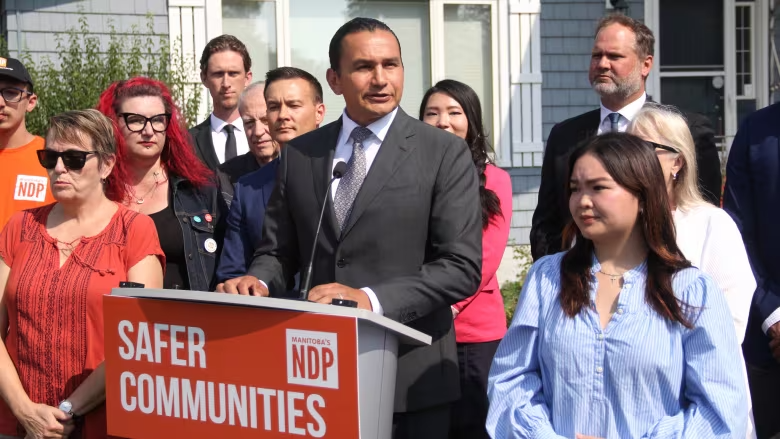After forming a majority government in October 2023, the Manitoba NDP delivered its first provincial budget on Tuesday. Understandably, much of the focus since has been on the budget’s big commitments to healthcare, as well as the dizzying array of targeted tax cuts and credits. But there are also some sizable updates to the funding of policing and jailing that warrant attention.
Premier Wab Kinew has constantly reiterated his fealty to cops, including rejecting accusations that he would defund the police, running a classic “tough on crime” campaign, and recently introducing a draconian set of bail system changes that have been blasted by Indigenous organizations. The new budget continues and accelerates this trend. There are many opaque and conflicting aspects of how the budget has been presented and communicated, but this is our current assessment of it.
In 2024/25, spending on provincial policing will increase by $28.6 million, from $270.6 million in 2023/24 to almost $300 million this year. While much of this line item goes to pay for RCMP operations, almost half of the increase — $13.7 million — appears to be going to “urban policing grants,” although the language on this changes throughout the budget. This dramatic increase in police spending is apparently justified as it “supports the delivery of police services in both urban and rural settings; the first budgeted increase since 2017, and better reflects current costs of delivering police services to all Manitobans.” It is unclear how such costs were estimated and evaluated, or what role police forces had in the process.
Some $4 million is being allocated to hire “up to” 25 mental healthcare workers to “work alongside law enforcement.” The framing of this certainly makes it sound like an expansion or replication of the cop-controlled ARCC program, a “co-response” approach that is greatly undermined by the continued involvement of police in dispatching, which the Police Accountability Coalition has long argued against. More unspecified funding is allocated to the opening of a new jail in Dauphin and the installing of quasi-cop “institutional safety officers” in hospitals. Another $8.6 million has been allotted for so-called “crime prevention” and adjacent goals that, unsurprisingly, are just cover for more policing and criminalization: greater funding for First Nations and Inuit policing, a dedicated program for youth criminalized for “serious violent offences,” an Indigenous Court Work Program, and a farcical $300 security system rebate for families and businesses.
At the same time, many other elements of the justice department are having their budgets frozen or even cut. Some of these are rather surprising and inconsistent with the spike in police spending, given that increased policing will inevitably lead to even more people in the punishment bureaucracy. These include a budget freeze of the Manitoba Prosecution Service ($43.8 million in 2024/25) and a $3.4 million cut to community corrections (from $33 million in 2023/24 to $29.7 million this year), although custody corrections is seeing a slight increase. Curiously, the Manitoba Criminal Intelligence Centre (created under the PCs as part of its amendments to the Police Services Act) and the notorious Criminal Property Forfeiture Unit are also having their budgets trimmed.
Far more concerningly, Legal Aid Manitoba is facing a budget freeze (at $36.6 million in 2024/25) and the Office of the Chief Medical Examiner, which conducts investigations/calls inquests into police killings, will face a slight cut. These decisions will undoubtedly have implications for the most oppressed and dispossessed people seeking legal representation and justice. Although they’re deeply reformist and overwhelmingly useless agencies, it’s also of note that the Law Enforcement Review Agency (LERA) and Independent Investigation Unit (IIU) are both receiving budget cuts of 9 percent each: down to $445,000 and $2.9 million in 2024/25, respectively.
As has been demonstrated over and over again, there is no relationship between policing and safety. Rather, policing and jailing dramatically endangers the lives of Indigenous, Black, and racialized people, with at least nine people killed by the Winnipeg Police alone in the last year. Even the long-awaited announcement of a safe consumption site has been contaminated by fully accepting police discourse concerning criminalized drugs, with Kinew pledging to “crack down on traffickers who provide the kind of illicit substances people would use at the sites,” despite drug busts being a major factor in creating the poisoned drug supply that people are dying from.
With this budget, the NDP has maintained a long-standing right-wing trajectory by increasing funding to policing at the expense of things that actually keep people safe. The “justice” budget is a shameful expansion of criminalization that — regardless of the government’s supposedly progressive bluster — will result in even more Indigenous people being policed, jailed, and criminalized.
